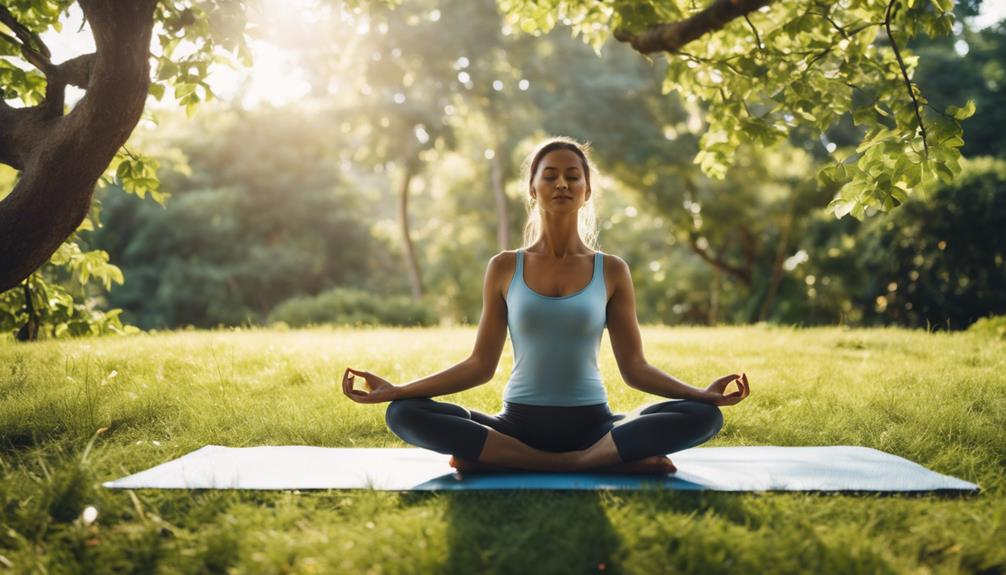Lifestyle hypnosis contributes to mental health by restructuring negative thoughts and behaviors, reducing stress, and enhancing resilience. Cognitive therapy in hypnosis changes harmful beliefs for improved well-being. Behavior modification helps in managing stress and developing healthier coping mechanisms. It breaks free from unhealthy habits and fosters positive changes. The mind-body link is crucial in holistic wellness, mindfulness meditation strengthens awareness for mental and physical health benefits. Lifestyle hypnosis tackles chronic pain, bad habits, and promotes positive lifestyle choices. Discover more about how lifestyle hypnosis enhances mental health and well-being.
Benefits of Lifestyle Hypnosis

Engaging in lifestyle hypnosis has been shown to offer a range of mental health benefits, including reduced stress levels and improved overall well-being. Cognitive therapy, a key component of lifestyle hypnosis, focuses on changing negative thought patterns and beliefs to promote healthier mental states.
By addressing these cognitive distortions through techniques like suggestion and imagery, individuals can experience a positive shift in their mindset and emotional well-being.
Behavior modification is another crucial aspect of lifestyle hypnosis that contributes to its mental health benefits. Through the process of hypnosis, individuals can reframe their behaviors and responses to stressors, leading to improved coping mechanisms and overall resilience.
This form of therapy helps individuals break free from maladaptive patterns and develop healthier habits that support their mental health.
Understanding Mind-Body Connection
An essential aspect to consider when delving into the realm of lifestyle hypnosis for mental health is understanding the intricate connection between the mind and body. The mind-body connection is a fundamental principle in holistic wellness, emphasizing that mental and physical health are interdependent.
Practices such as mindfulness meditation play a crucial role in strengthening this connection by fostering awareness of thoughts, emotions, and bodily sensations. Mindfulness practice, a key component of lifestyle hypnosis, encourages individuals to cultivate a non-judgmental awareness of the present moment.
This practice helps in reducing stress, anxiety, and improving overall mental well-being. Research has shown that regular mindfulness meditation can lead to changes in brain regions associated with memory, empathy, and stress regulation, highlighting the profound impact of mind-body techniques on mental health.
Reducing Stress and Anxiety

Practicing mindfulness meditation has been shown to be effective in reducing stress and anxiety levels, offering a valuable technique for enhancing mental well-being. Mindfulness practices involve focusing on the present moment without judgment, which can help in managing overwhelming thoughts and emotions.
Deep breathing is often incorporated into mindfulness exercises, promoting relaxation and reducing the physiological symptoms of stress and anxiety.
In addition to mindfulness practices, various relaxation techniques can also be beneficial in combating stress and anxiety. These techniques may include progressive muscle relaxation, guided imagery, and visualization exercises. Engaging in activities such as yoga or tai chi can combine physical movement with mindfulness, offering a holistic approach to stress reduction.
Coping strategies play a crucial role in managing stress and anxiety. Developing healthy coping mechanisms, such as journaling, talking to a therapist, or practicing gratitude, can provide individuals with effective ways to navigate challenging situations.
Improving Sleep Quality
To further enhance your mental well-being, exploring strategies to improve sleep quality is vital as sufficient and restful sleep is closely linked to overall mental health. Sleep hygiene practices, such as maintaining a consistent sleep schedule, creating a relaxing bedtime routine, and optimizing your sleep environment, can significantly impact the quality of your sleep. It's important to prioritize these habits to ensure a restorative night's rest.
In addition to sleep hygiene, incorporating relaxation techniques into your bedtime routine can further enhance your sleep quality. Mindfulness practices, like deep breathing exercises or body scans, can help calm your mind and body, promoting a more peaceful transition to sleep. Visualization exercises, where you imagine tranquil scenes or positive outcomes, can also aid in reducing racing thoughts and promoting relaxation before bedtime.
Enhancing Self-Esteem and Confidence

Enhancing self-esteem and confidence is crucial for maintaining positive mental health and well-being. By utilizing lifestyle hypnosis techniques, individuals can work towards improving relationships, boosting motivation, overcoming fears, and achieving goals.
Studies have shown that hypnosis can be an effective tool in enhancing self-esteem and confidence by addressing deep-rooted beliefs and thought patterns that may be holding individuals back. Through positive suggestions and guided imagery, hypnosis can help reframe negative self-perceptions and instill a more positive self-image.
When self-esteem and confidence are enhanced, individuals are more likely to engage in positive social interactions, leading to improved relationships with others. Moreover, increased confidence can boost motivation levels, allowing individuals to pursue their goals with greater determination and resilience.
Managing Chronic Pain
Managing chronic pain involves utilizing various strategies and techniques to alleviate discomfort and improve overall quality of life. When it comes to pain management, taking a holistic approach is essential. Holistic pain management focuses on treating the individual as a whole, considering physical, emotional, and social factors that may contribute to the experience of chronic pain.
One effective strategy in holistic pain management is combining lifestyle changes with mind-body techniques like hypnosis. Research has shown that hypnosis can help in reducing the perception of pain, promoting relaxation, and enhancing coping mechanisms. By incorporating hypnosis into your pain management plan, you may experience improvements in pain symptoms and overall well-being.
Additionally, holistic approaches often include practices such as mindfulness meditation, yoga, acupuncture, and dietary modifications. These complementary therapies work synergistically to address the underlying causes of chronic pain and promote healing from multiple angles.
Embracing a holistic approach to pain management can empower you to take control of your pain and improve your quality of life.
Breaking Bad Habits

How can lifestyle hypnosis be utilized to break bad habits effectively?
Habit formation is deeply ingrained in the subconscious mind, making it challenging to overcome through sheer willpower alone. This is where lifestyle hypnosis can play a significant role in behavior modification.
Through hypnosis, individuals can access their subconscious mind and reprogram negative patterns that contribute to bad habits. By addressing the root cause of these behaviors, such as stress or emotional triggers, hypnosis can help individuals break free from destructive habits like smoking, overeating, or nail-biting.
Behavior modification techniques used in lifestyle hypnosis sessions focus on creating new, healthier habits to replace the old ones. This process involves reinforcing positive affirmations and visualizations to strengthen the desired behavior. Over time, these suggestions become deeply embedded in the subconscious, leading to lasting changes in behavior.
Promoting Positive Lifestyle Changes
To facilitate positive lifestyle changes, incorporating lifestyle hypnosis can help individuals restructure their thought patterns and behaviors effectively. Healthy habits like regular exercise, balanced nutrition, and adequate sleep play a vital role in mental health. Behavioral changes, such as reducing stress levels and improving time management, are also crucial for overall well-being. Lifestyle hypnosis acts as a tool to reinforce these positive changes by targeting the subconscious mind, where habits and beliefs are deeply rooted.
Research suggests that lifestyle hypnosis can enhance motivation, self-control, and resilience, making it easier to adopt and maintain healthy habits. By tapping into the power of suggestion and visualization, individuals can develop a more positive mindset towards lifestyle changes. This approach can lead to long-lasting improvements in mental health by promoting self-care and overall wellness.
Conclusion
In conclusion, lifestyle hypnosis plays a crucial role in improving mental health by addressing various issues such as stress, anxiety, sleep quality, self-esteem, chronic pain, bad habits, and promoting positive lifestyle changes.
Through the mind-body connection, hypnosis can help individuals make positive changes in their lives, leading to overall well-being and mental wellness.
Consider incorporating lifestyle hypnosis into your mental health routine to experience the benefits firsthand.










































